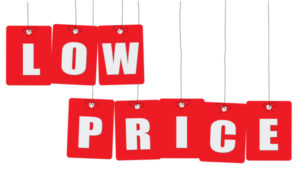After years of encouragement by the Federal Reserve, inflation is finally ticking up in America. Now, if you believe your dollars ought to be worth as much when you spend them as when you earn them, this is not ideal. But that’s a story for a different post.
One place where inflation is not rising is in retail. I’ve been explaining my Bezos Law theory for a few years now. In it I say that any industry Jeff Bezos enter sees prices decline. No industry has been further consumed by Bezos than retail. Amazon.com has come to dominate e-commerce, and that is having effects in the world of brick and mortar retail as well.
In a new article by Bloomberg reporter Mark Whitehouse explains how Amazon.com is holding down prices. He writes:
Increasingly, economists are talking about the “Amazon effect.” The idea is that as online retailers gain market share, they’re putting pressure on brick-and-mortar shops to keep prices down. This, in turn, might be preventing inflation from getting back up to normal.
The latest U.S. inflation data offer some support for this idea. As of September, the price index for commodities excluding food and energy — a category including apparel, electronic goods and lots of other things that online retailers sell — was down a full percent from a year earlier. The decline shaved about a quarter percentage point off the broader “core” inflation rate, which clocked in at just 1.7 percent.
It hasn’t always been that way. For much of the 20th century, prices of retail goods moved more or less in sync with everything else. But in the 1990s, the rise of Walmart and imports from China precipitated sharp price declines — to the benefit of U.S. consumers and the chagrin of manufacturers. The pressure seemed to be easing in the aftermath of the last recession, but it returned in recent years with the growth of online retail.
Read more here.
E.J. Smith - Your Survival Guy
Latest posts by E.J. Smith - Your Survival Guy (see all)
- Your Survival Guy Heading into Labor Day Weekend - August 30, 2024
- Are You Guided by the Prudent Man? - August 30, 2024
- Have Your Cake and Eat It Too - August 30, 2024
- When You Should Be a Buyer, not a Seller: Part III - August 29, 2024
- America Has a Record Number of 401(k) Millionaires - August 29, 2024















